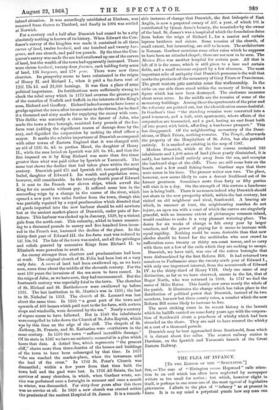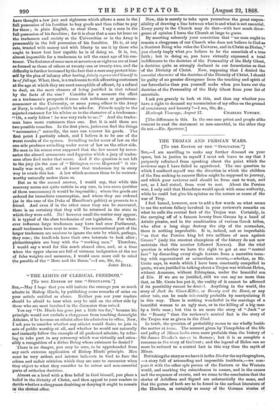THE PLEA OF INFANCY.
[To THE EDITOR OF THE "SPECTATOR."] SIR, —The case of " Rivington versus Hopwood" calls atten- tion to an evil which has often been neglected by newspaper writers as too small for notice ; but which, however slight in itself, is perhaps in one sense one of the most typical of legislative grievances. I allude to the plea of " infancy " as at present in force. It is to my mind a perpetual puzzle how any man can have thought a law just and righteous which allows a man in the full possession of his faculties to buy goods and then refuse to pay for them ; in plain English, to steal them. I say a man in the full possession of his faculties ; for it is clear that a man let loose on the tradesmen and society at the Universities or in the Army is presumably in the full possession of his faculties. He is, at any rate, trusted with money and with liberty to use it by those who ought to know best how capable he is of doing so. It is, too, almost impossible for a tradesman to tell the exact age of his cus- tomer. The features of some men at seventeen or eighteen are at least as formed as those of others at twenty-one or twenty-two, and the difficulty is further increased by the fact that a man may protect him- self by the plea of infancy after having falsely represented himself to be of full age. What, then, is a tradesman to risk affronting customers at the age at which they are most susceptible of affront, by a refusal to deal, on the mere chances of being justified in that refusal by the facts of the case? Consider for a moment the effect on a tradesman's prospects if some rich nobleman or gentleman- commoner at the University, or some young officer in the Army or Navy, is refused goods which he asks for. Friends apply to the rejected customer for his advice as to the character of a tradesman : "Oh, a surly fellow ! he was very rude to me I" And the trades- man loses more customers than one. But it is said there are two possible remedies. In the first place, juries can find the things " necessaries ;" secondly, the man can recover his goods. The first point I partially admit, and I believe it to be one of the Worst results of the system. Swindling under cover of law on the one side produces swindling under cover of law on the other side. No man in his senses ever supposed that the law meant by neces- saries the absurd ornaments and fopperies which a jury of trades- men often find under that name. And if the question is not left to the jury (in the case of " Rivington versus Hopwood" it vir- tually was not), still we all know that tradesmen try in every way to evade this law. A law which assumes them to be untrust- worthy naturally makes them so.
But as to the second answer, I would say, that while this recovery seems not quite certain in any case, in two cases (neither of them uncommon) it would be impossible ; where the goods are ordered for immediate consumption, and where they are ordered (as in the case of the Duke of Hamilton's goblet) as presents to a friend. And even if in the other cases they can be .recovered, there is no certainty that they will be returned in the state in which they were sold. No! however small the matter may appear, it is typical of the class tendencies of our legislation. For what- ever influence large tradesmen may have had over Parliament, email tradesmen have next to none. The conventional part of the larger tradesmen are anxious to ignore the arts by which, perhaps, they rose ; the landlords have their own interests to look after ; philanthropists are busy with the "working men." Therefore, I would say a word for this much abused class, and, at a time when the upper classes are full of virtuous indignation at the use of false weights and measures, I would once more call to mind the parable of the "Mote and the Beam."—I am, Sir, &c.,
JOHN BULL.































 Previous page
Previous page